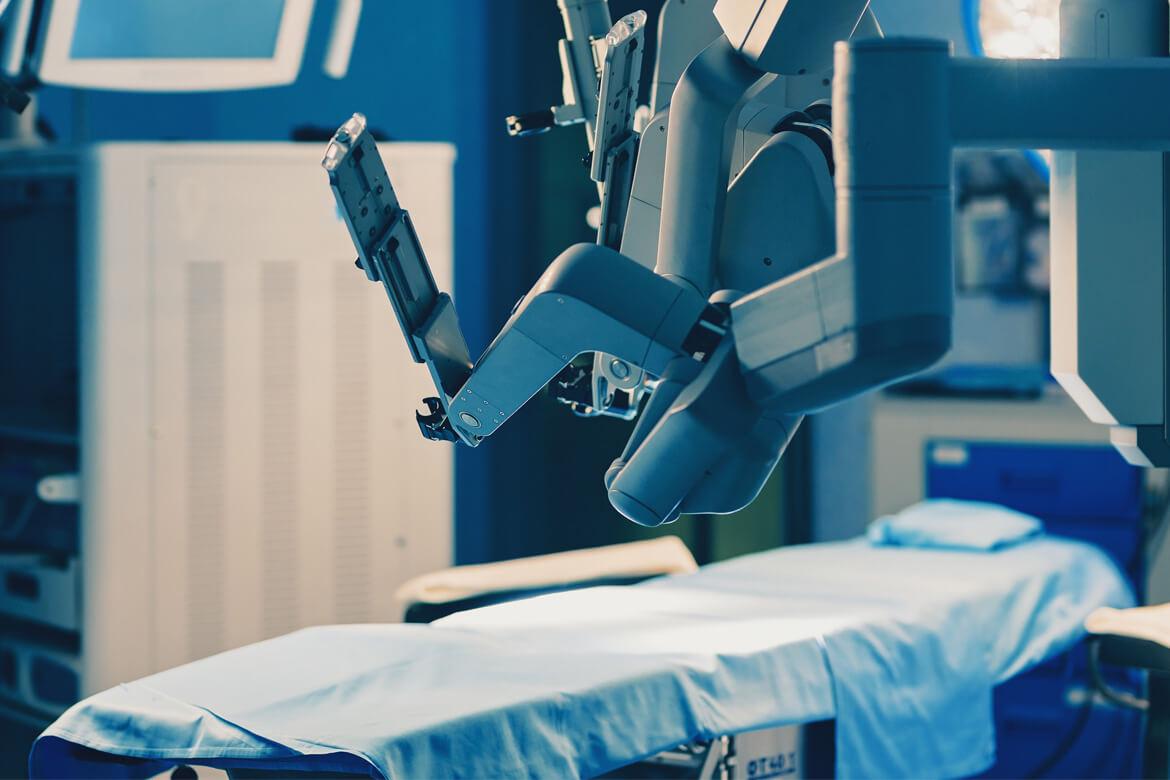What is a robotic radical prostatectomy?
Robotic radical prostatectomy is a robotic-assisted laparoscopic surgery that removes the entire prostate gland. Surrounding tissues such as the seminal vesicles and nearby lymph nodes may also be removed.
This procedure uses a robot-assisted surgical system which:
- Gives a magnified, three-dimensional view of the surgical field. This helps the surgeon visualise and avoid blood vessels to reduce unnecessary blood loss.
- Uses robot 'arms' and 'wrists' that can be precisely controlled by the surgeon for greater accuracy and dexterity.
- Reduces the time taken to position the patient and equipment to less than 15 minutes. The whole operating time takes just 2.5 hours.
- Improves outcomes by preserving nerves and tissues.
Why do you need a robotic radical prostatectomy?
Robotic radical prostatectomy or robotic prostate removal is used as a treatment for prostate cancer in men whose cancer is limited to the prostate.
Compared with conventional open surgery, robotic radical prostatectomy:
- Has a lower risk of rectal injury.
- Greatly lowers the need for blood transfusions.
- Shortens the duration of dependence on a catheter.
- Allows better conservation of the nerves needed to achieve and maintain an erection.
- Is a minimally invasive surgery with a low conversion to open surgery.
- Requires smaller and fewer cuts, which results in less blood loss and pain.
- Requires a shorter hospital stay of 2 – 3 days (compared with 5 – 7 days).
- Results in faster urinary continence (ability to control urination).
- Results in faster recovery of erectile function.
What are the risks and complications of robotic radical prostatectomy?
Robotic radical prostatectomy carries a very low risk of serious complications.
In rare cases, there may be nerve damage that can lead to:
Other general complications that may arise include:
- Blood clots
- Poor wound healing
- Infection or bleeding after the operation
- Groin hernia, also known as inguinal hernias
- Narrowing of the urethra
- Urinary leakage
How do you prepare for robotic radical prostatectomy?
Before the operation, your doctor will review your medical history. You may also have to undergo some scans and tests.
Once your procedure is scheduled, your doctor will advise you on how to prepare. This may include modifying your diet or preparing your bowels. In general, you need to fast 6 – 8 hours before the procedure.
Note: If you are taking any medication or herbal supplements, you should inform your doctor. You may need to adjust or stop taking some medication before the procedure (e.g. aspirin, blood thinners).
What can you expect in a robotic radical prostatectomy?
Robotic radical prostatectomy is performed under general anaesthesia, so you will be asleep during the operation. The procedure is performed laparoscopically, using small incisions to insert surgical instruments.
Estimated duration
The procedure lasts about 2.5 hours.
During the procedure
Your surgeon will:
- Make small incisions in your abdomen to access your prostate.
- Use the incisions to insert surgical tools and a camera connected to the robot-assisted surgical system.
- Use the robot-assisted surgical system console to remove your prostate through one of the incisions.
After the procedure
You will be transferred to a recovery room for monitoring after the procedure and may need to stay for a few days in the hospital.
In the days following the surgery, you may:
- Need to urinate through a catheter.
- Be encouraged to walk around to lower the risk of blood clot formation.
- Experience post-operative pain. This is normal and will be managed with medication.
You may experience urine leakage as a side effect. This is due to the removal of your prostate, and a cut to the neck of your bladder, both of which play a role in continence. You will be taught Kegel's exercises to strengthen your external urinary sphincter to regain urine control.
Care and recovery after robotic radical prostatectomy
While recovering from the procedure, you should avoid strenuous physical exercise until your doctor gives you the go-ahead.
You should be able to return to work or resume full activity in about 2 – 3 weeks. Maximum urinary and sexual function usually returns within 6 months.
After a robotic radical prostatectomy, you may need regular monitoring to make sure prostate cancer does not return.






